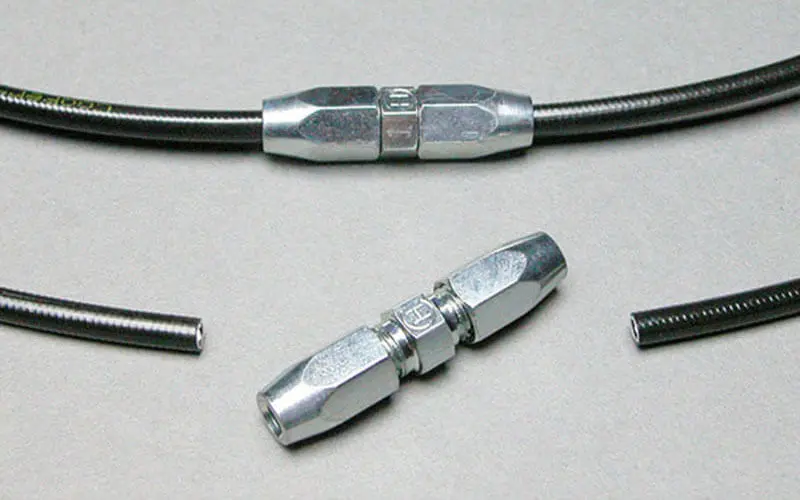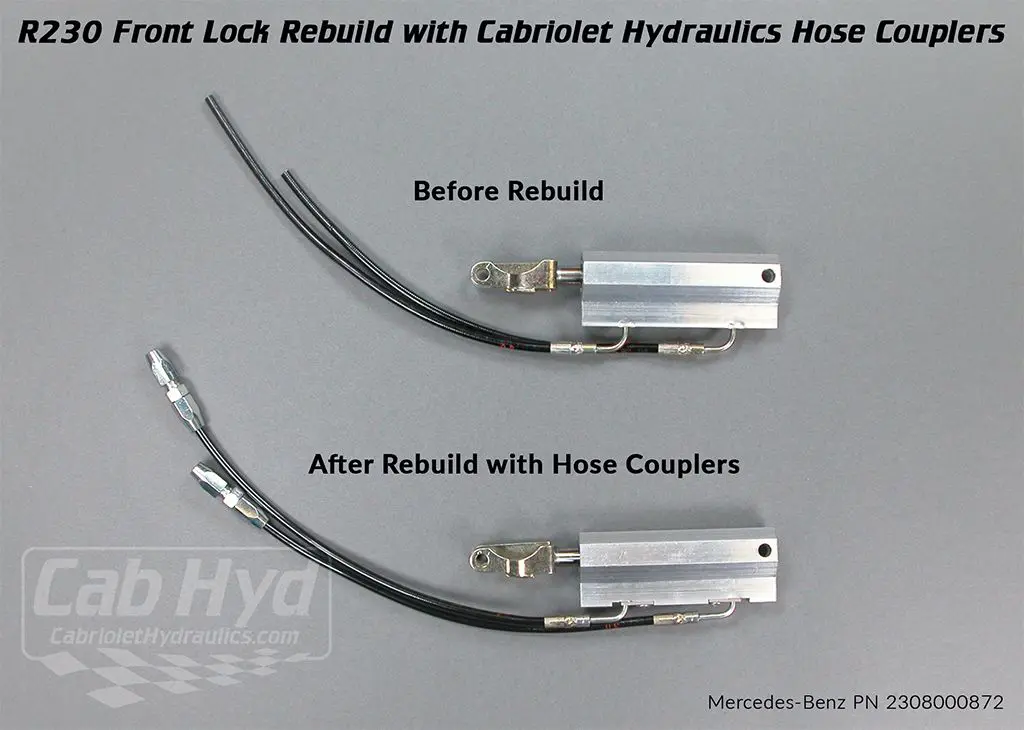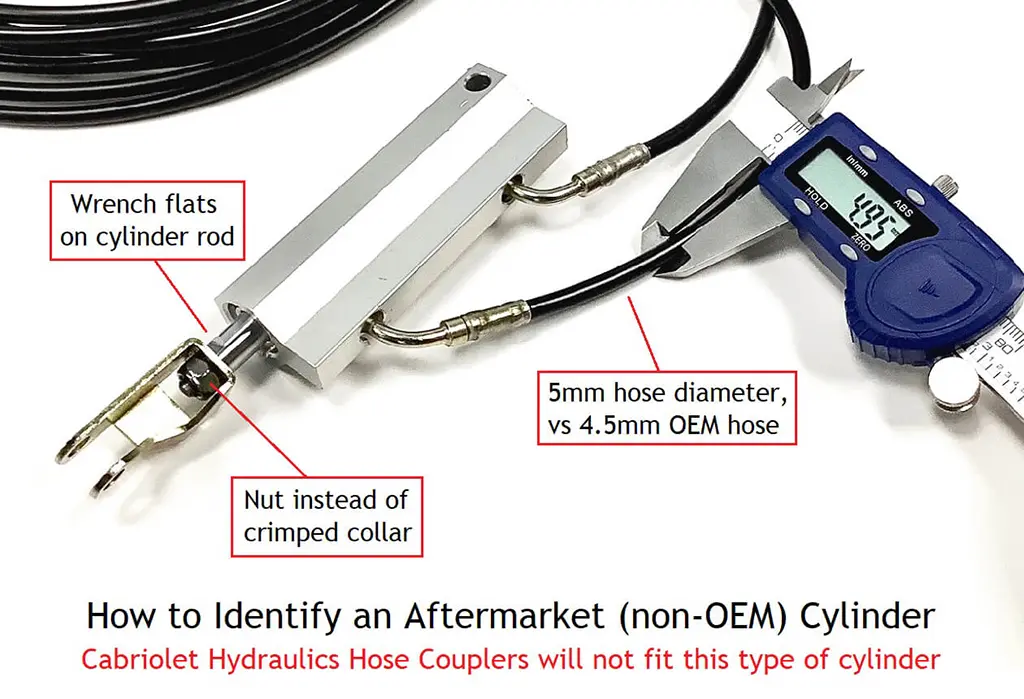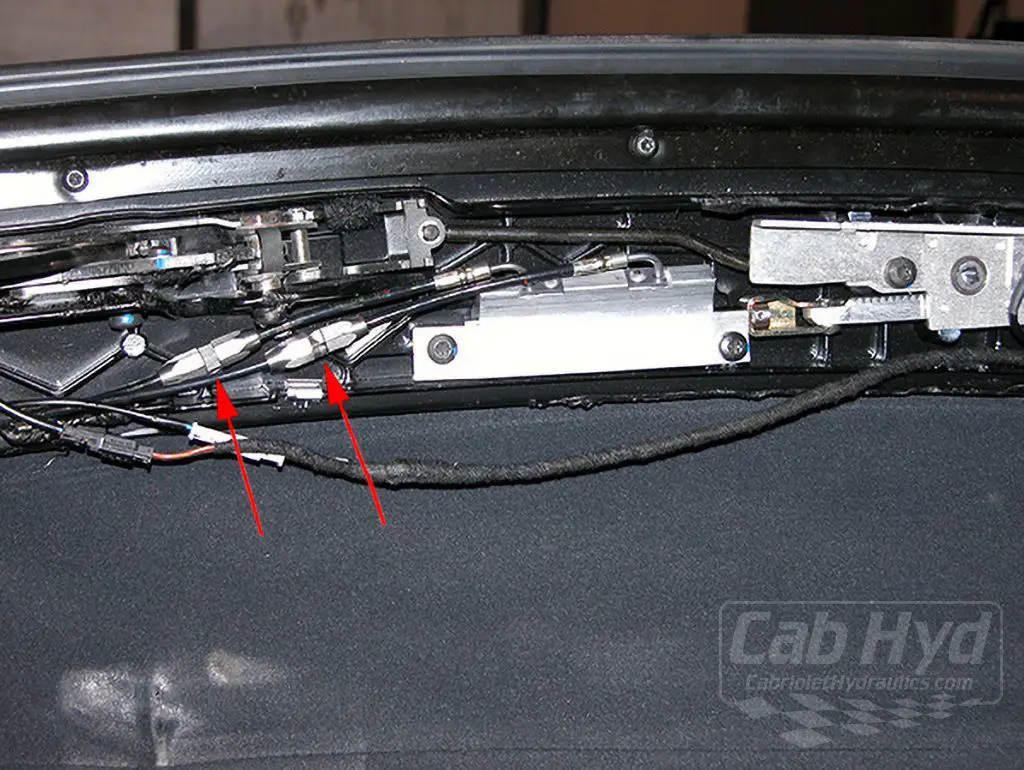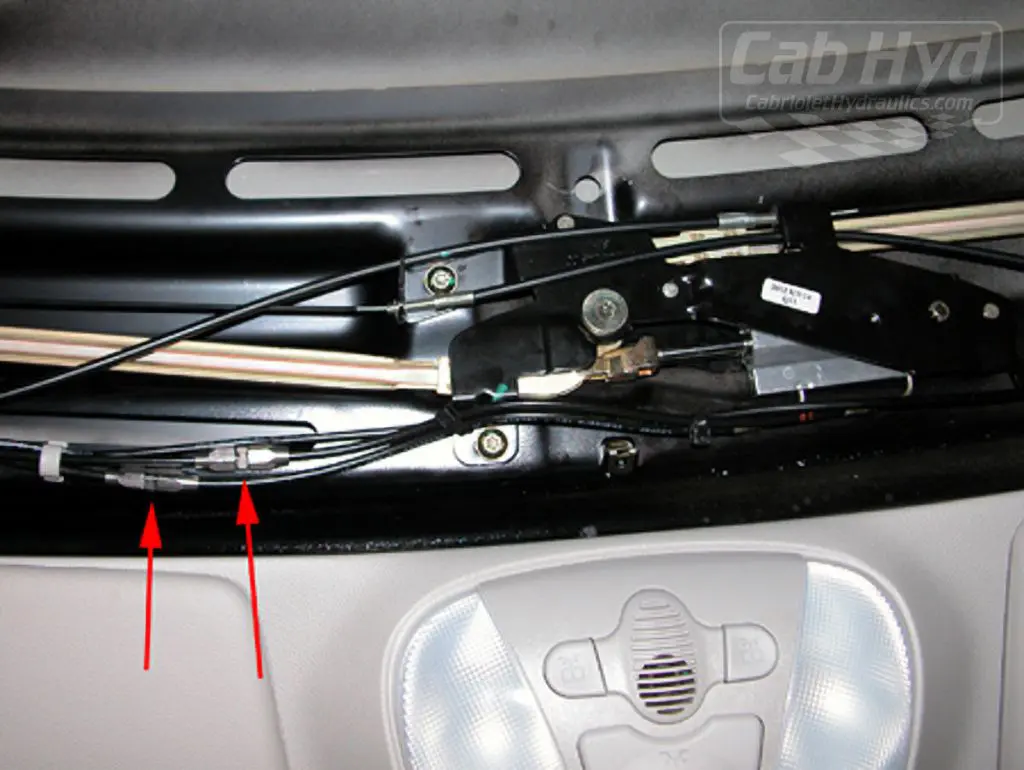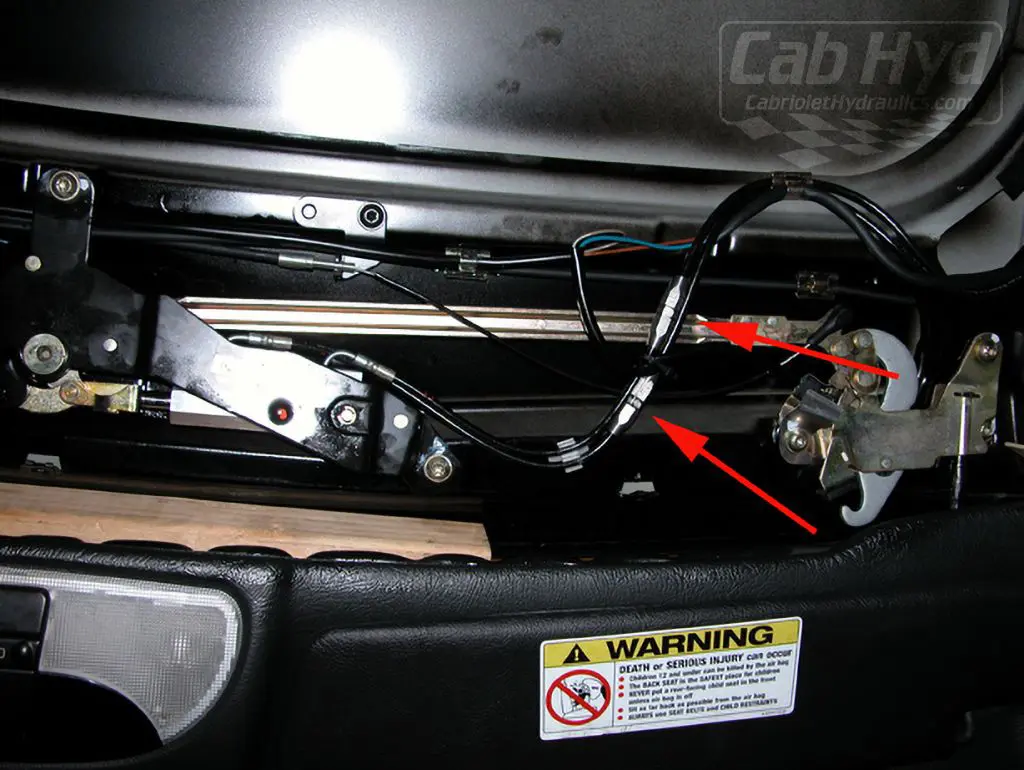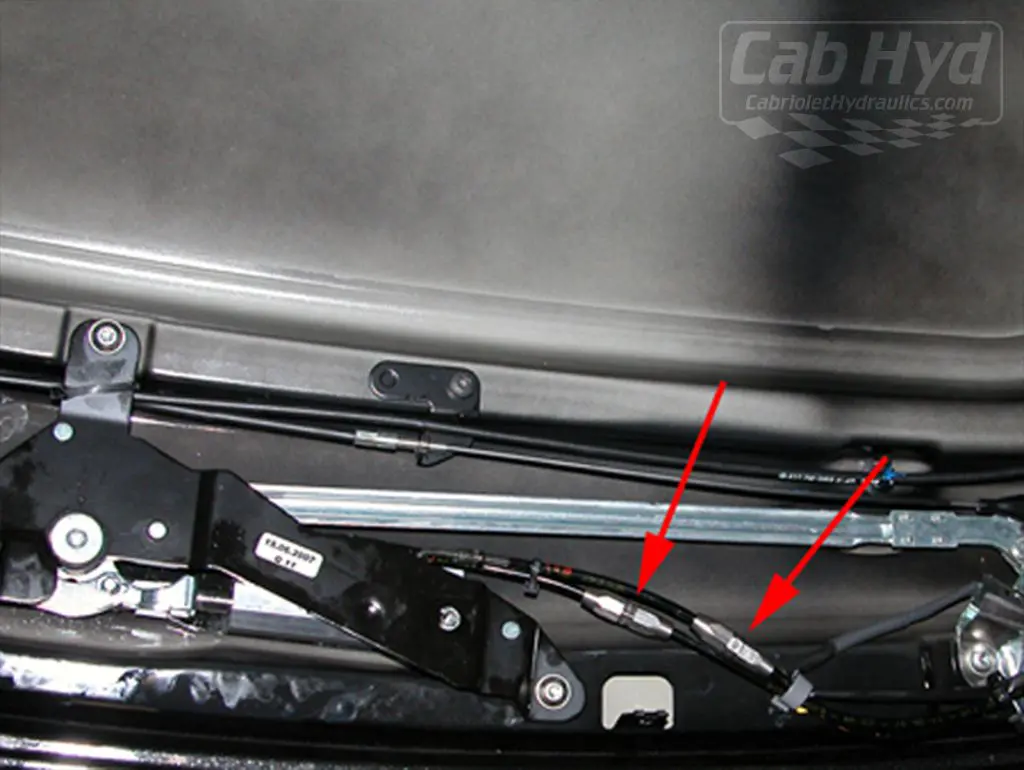Front Latch Quick Fix
Save time removing & reinstalling your front latch cylinder with the Cabriolet Hydraulics Front Latch Quick Fix!
Repairing the vario-roof front latch cylinder can be a time-consuming task. This cylinder is located beneath the front edge of the roof on Mercedes-Benz R230, R170, and R171 chassis, as well as Ferrari 360 and 430 Spider models. On these cylinders, the factory-installed hoses are permanently crimped to the cylinder and detach only at the pump, located at the rear of the vehicle.
With our innovative and patented solution, the process becomes far more efficient. By cutting the hoses near the cylinder, the front latch cylinder can be easily removed, dramatically reducing the labor typically involved in its removal and reinstallation.
Our Front Latch Quick Fix cylinders are expertly rebuilt and shipped with Hose Couplers* pre-attached to the cylinder-side hoses for seamless installation. Reconnecting the hoses is quick and straightforward, requiring only basic hand tools like a 10mm box wrench, vise grips, and pliers. This method ensures a connection that matches the strength of the original factory fittings.
Improperly routed hoses can interfere with the convertible top mechanism, potentially leading to punctures, pinching, or cylinder actuation issues. Cabriolet Hydraulics’ Hose Couplers* eliminate the need to remove and reinstall the hydraulic lines all the way back to the pump. This preserves the original hose routing, prevents routing errors, and simplifies the entire repair process. Important Note: The Hose Couplers* are NOT reusable.
*Hose Coupler US Patent 9,482,375
Important aftermarket cylinder information
If you intend to use Cabriolet Hydraulics hose repair couplers to reconnect the front latch cylinder, do not cut the hoses until you confirm that the hose diameter is 4.5mm (.177”).
These hydraulic cylinders have shown up on the market recently; they are not Original Equipment Manufacturer (OEM). These aftermarket cylinders can be identified by the characteristics shown in the image on the right. Due to their larger hose diameter, our hose couplers will not fit these non-OEM cylinders.
The Cabriolet Hydraulics Front Latch Cylinder Rebuild includes the following:
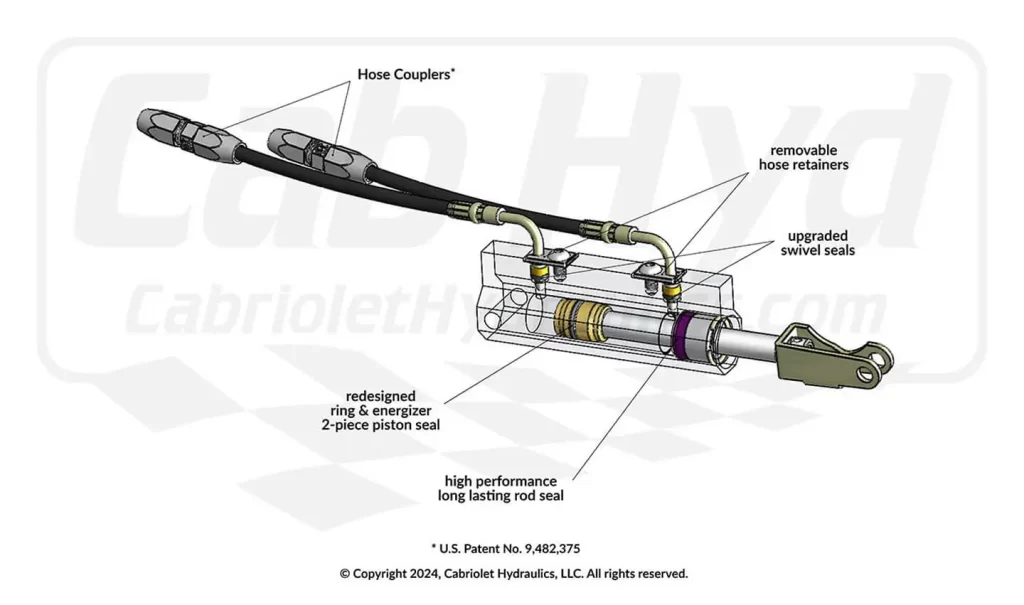
Rod Seal Replacement: The original leaking rod seal is replaced with a high performance custom rod seal made from a hard-wearing elastomer that significantly increases its service life.
Piston Seal Replacement: Lazy or incomplete locking and unlocking symptoms are often caused by piston seal failure, known as piston blow-by. We replace the original 2-piece piston seal with our improved version, ensuring optimum piston seal performance.
Hose Swivel Seal Replacement: Our service includes swivel seal replacement as part of the standard rebuild. If they are not leaking already, the original swivel seals will eventually leak. The top of the roof is exposed to the sun for long periods of time at elevated temperatures. Heat degrades the rubber seals in the crimped steel elbow connections, causing the seals to leak. We replace the hose swivel seals with long-lasting heat-resistant seals. We believe that the rebuild is not complete without replacing these seals.
Removable Hose Retainers: This added feature is a result of replacing the swivel seals. The hose connections must be removed from the cylinder by first machining away the crimps around the hose connection ports in order to remove and replace the swivel seals. We reattach the swivel hose connectors with screw-on retainers. In the unlikely event that future service of the cylinder is necessary, simply disconnect the hoses from the cylinder and remove the cylinder. The hoses remain attached to the car.
Two Hose Couplers: Our patented Hose Couplers* will come attached to the hoses on your cylinder for quick installation. The hoses are permanently reconnected to the car with basic hand tools. Hoses are crimped internally and externally the same way as they are with the factory connectors. Hose repair couplers are NOT reusable. Most hydraulic systems operate at a peak pressure of 200 bar or, 2900 psi. Cabriolet Hydraulics Hose Couplers are pressure tested to 10,000 psi without failure.
Coupler Installation Method Examples & Cutting Instructions
Important Note: Cut the hose square across with a sharp utility knife. When cutting, use a small block of wood as a cutting board to support the hose. Be careful not to cut through surrounding electrical wiring. Do not use wire/diagonal/side cutters, saws or cut-off wheels. Such tools distort the cut ends of the hose and produce loose particles that can enter the hose and cause hydraulic system failure.
1998-2004 SLK (R170 chassis), PN 1708000072
Hose Couplers* on a 2003 Mercedes-Benz SLK 320
Click photo to enlarge
Visit our Hydraulic Hose Repair Couplers page to view the installation requirements and instructions.
*Hose Coupler US Patent 9,482,375
Cabriolet Hydraulics patented hydraulic Hose Couplers* were developed out of our vision of simplifying the repair of convertible top hydraulic systems.
-
If you’re looking to repair a section of damaged hydraulic hose and want to avoid replacing the entire line, our Hose Couplers may be the solution for you. Our Hose Couplers are designed to repair or reconnect the most common factory installed hoses with 1.8 & 2.0mm internal and 4.5mm outer diameters.
*Hose Coupler US Patent 9,482,375
